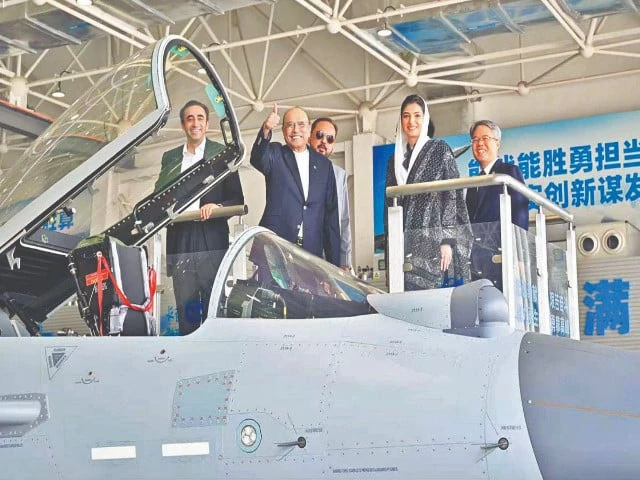Islamabad, Beijing to deepen defence ties, says president
MIANYANG/SHANGHAI:
President Asif Ali Zardari spent Sunday deepening Pakistan’s strategic partnership with China, touring a flagship defence aviation complex and experiencing the country’s high-speed rail network first-hand.
The president’s activities are part of his ongoing 10-day state visit to China, which began on Friday and is focused on enhancing bilateral ties, including the further development of the China-Pakistan Economic Corridor (CPEC).
In a significant demonstration of the nations’ close defence cooperation, Zardari, constitutionally the Supreme Commander of the Armed Forces of Pakistan, visited the Aviation Industry Corporation of China (AVIC). This marked a historic first, as no foreign head of state had previously visited the complex.
During the tour, the president reaffirmed that Pakistan and China would continue to expand collaboration in defence production and aviation, further deepening their all-weather strategic cooperative partnership.
He highlighted the critical role of existing projects, noting that the J-10 and JF-17 had greatly strengthened Pakistan Air Force, a fact clearly demonstrated during May 2025’s ‘Marka-e-Haq’ and ‘Operation Bunyanum Marsoos’.
He was briefed on AVIC’s advanced capabilities, including the J-10C fighter jet that played a crucial role during the recent conflict with India, the co-production of the JF-17 Thunder, as well as progress in the J-20 stealth 5th-generation fighter aircraft.
The president was also briefed on unmanned aerial vehicles (UAVs), and integrated command-and-control systems. Zardari lauded AVIC as a symbol of China’s technological advancement and of the enduring strategic partnership between the two nations.
Earlier in the day, the president travelled from Chengdu to Mianyang by a high-speed train, covering the journey in around half an hour. During the train journey, he was briefed on its operations, service, safety systems, and environmental advantages.
Officials highlighted that China now operates the world’s largest high-speed rail network of over 45,000 kilometres of dedicated track, carrying more than 2 billion passengers annually with trains running at up to 350 km/h.
The president praised China’s achievements in sustainable and resilient transport, including pollution-free electric propulsion and earthquake early warning technologies, describing them as a marvel of railway engineering.
He noted that such innovations offered valuable lessons for other countries including Pakistan. President Zardari later arrived in Shanghai on Sunday evening, where he was warmly received by Chinese officials.
The Pakistan-China relationship, established in 1950 and described as an “all-weather strategic cooperative partnership,” is also a major economic channel; bilateral trade volume surpassed $23 billion in 2024.
China has become Pakistan’s largest arms supplier, and the advancement of this partnership, including the $64 billion China-Pakistan Economic Corridor (CPEC) project, is a central focus of the president’s visit, which will continue to Xinjiang.
The president was accompanied throughout the day’s events by a delegation, including Pakistan Peoples Party (PPP) Chairman Bilawal Bhutto Zardari, First Lady Aseefa Bhutto Zardari, Senator Saleem Mandviwalla, and the ambassadors of both nations.

